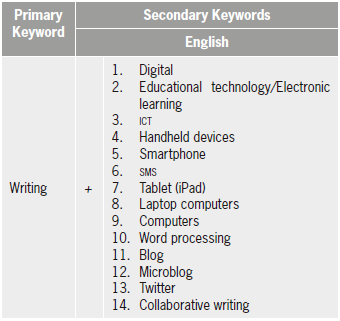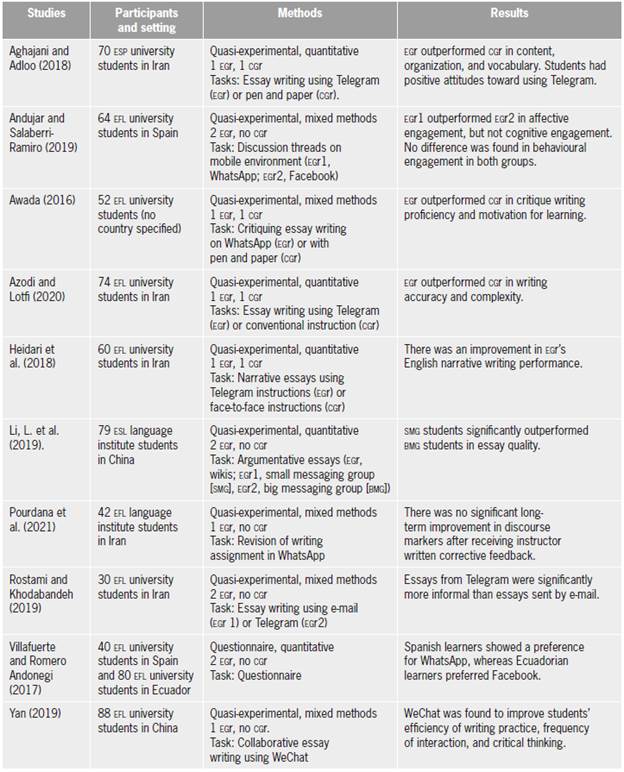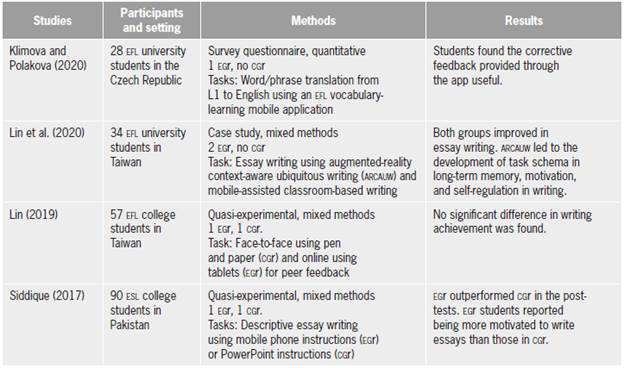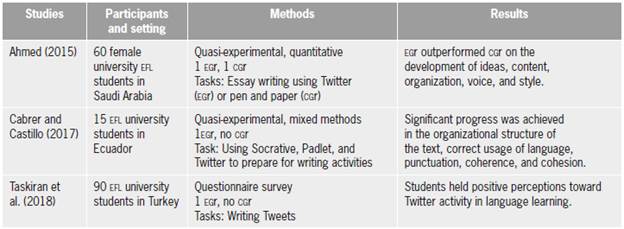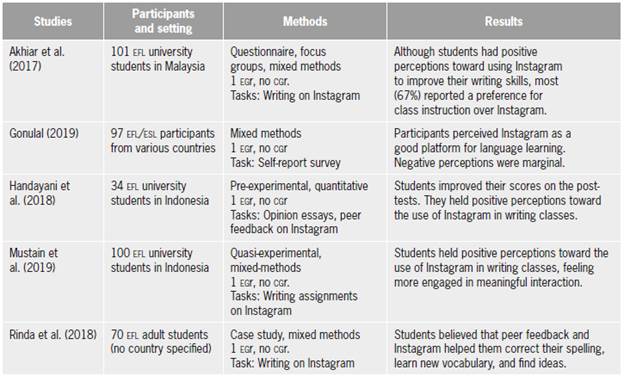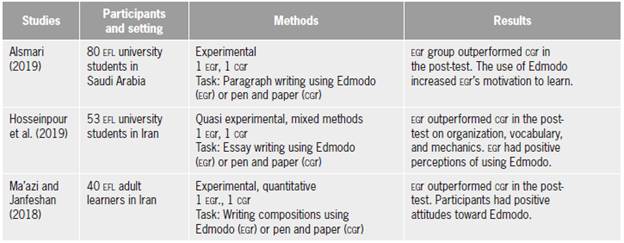Introduction
The process of digitalization is leading to a fundamental social change affecting all spheres of social life (Kergel & Heidkamp, 2022). In the pedagogical field, more specifically in the field of second language pedagogy, there is a need for restructuring key concepts such as learning, teaching and education that consider socio-economic and cultural changes. Indeed, "with the ever-growing significance and diversification of media, there is a call to challenge, renegotiate and expand on current discourses that have formulated media literacy as an integral objective in 21st-centure education" (Lütge, 2022 p. 1).
This paper reports on a systematic literature review on the use of technologies in ESL/EFL writing classes. In a previous knowledge synthesis concerning the use of technologies in L1 and L2 classes (Lira-Gonzales & Grégoire, 2022), the scope of study was limited to elementary and secondary educational levels, and further research in the context of tertiary education was proposed.
The present literature review responds to that call aiming to: (1) review empirical studies carried out between 2015 and 2021on the use of technologies in ESL/EFL tertiary writing classes and (2) synthesize and assess the impacts of digital technologies on written texts and the writing process.
We hope that this literature review contributes to analyse the implications of cultural change on second language education in the digital age by bringing together various studies engaging with electronic writing practices in second language education. In painting a picture as to the current landscape of second and foreign language writing practice in formal and informal contexts, this work aims to outline practices of use that are promising for implementation within second and foreign language education.
Method
To include only the most recent research findings, we reviewed full articles published in peer-reviewed academic journals between 2015 and 2021.
To conduct the literature review we established a series of keywords connected with different aspects of digital writing. As in Lira-Gonzales and Grégoire (in press), we based all searches on the word "writing" combined with a modifier related to concepts, practices, and tools in digital technologies. Table 1 presents the keywords.
The process of analysing the 355 references initially found followed the criteria listed in LiraGonzales and Grégoire (in press), except for the students' educational levels. Therefore, the relevance of an article was determined by the following conditions:
It must address a form of digital writing practiced by learners.
It must be published in a peer-reviewed academic journal.
It must present the results of an original empirical study.
It must be focused on students (learning), not teachers.
It must present a study conducted at a college, university, or language institute (adult students).
It must present a study concerned with English language learning as an L2/FL.
We independently vetted a sample of 60 texts and achieved 98.5% intercoder reliability. After analysing the titles and abstracts of all 355 texts, 15% were identified as out of scope, 2.8% were not published in academic journals, 2% were not based on original empirical research, 0.3% focused exclusively on teachers, 11% were concerned with either elementary or secondary school, 31% were published prior to 2015, and 5% investigated languages other than English. In the end, 32.9% of the found references met all the criteria for retention according to the systematic review objectives.
We read and analysed each retained article, importing their PDFS into NVivo and coding them according to the categories in Lira-Gonzales and Grégoire (in press). Table 2 presents the text category codes.
Table 2 Text categories codes
| Database | Possible values |
|---|---|
| Research questions | Objectives considered relevant for this knowledge synthesis |
| Country | Country in which the study took place |
| Data collection environment | Urban, suburban, rural environment, environment not mentioned |
| Teaching level | College, university, language institute |
| Sector | Private, public, no sector mentioned |
| Length of technology implementation | Less than 2 months, 2-4 months, 5-7 months, more than 8 months, no duration mentioned |
| Web-based tools | Blogs, computers, e-readers, Edmodo, Facebook, Instagram, messaging apps, pod-casts, smartphone, storytelling websites, Twitter, wikis, word processors |
| Pedagogical use | Argumentative texts, collaborative writing, academic writing, peer feedback, student perceptions, summary writing |
| Equipment | Desktop computer, laptop computer, tablet, smartphone, e-reader, equipment not mentioned |
| Qualitative data collection method | Interviews, observation, questionnaire, student's productions, focus groups |
| Quantitative data collection method | Standardized tests, evaluation by criteria, keystroke logging |
| Analysis method | Inductive analysis, content analysis, descriptive statistics, inferential statistics |
| Research types | Experimental, quasi-experimental, case study, action-research, control group, no control group, qualitative, quantitative, mixed methods |
| Number of participants | 0-10, 11-25, 26-50, 51-75, 76-100, 101 + |
| Conclusions and results | Conclusions and results related to objectives considered relevant |
Source: Author's own elaboration (2021).
These codes allowed us to produce a cross-reference matrix to understand the studies' characteristics, presented in the following sections.
Results and discussion
In the following sections we will present and discuss the results of this systematic review on the use of technologies in ESL and EFL tertiary writing classes.
For research purposes, we preselected 355 journal articles referencing the impact of information and communication technologies (ICTS) on ESL/EFL writing. We excluded 248 articles according to the following criteria: (1) participants not in language institutes, college, or university (n=44); (2) non-empirical studies (n=6); (3) teacher-centred studies (e.g., teachers' perceptions or practices related to the use of ICTS to improve writing) (n=1); (4) studies of L2s other than English (n=19); (5) studies outside the scope of the knowledge synthesis (e.g., studies of ICTS used for pedagogical purposes without examining their impact on writing skills) (n=60); (6) studies not published in academic journals (n=9); and (7) studies published before 2015 (n=109). Based on the established criteria and methodology, we selected 107 articles for this review (henceforth, the retained studies).
The following subsections present a synthesis of the 107 studies selected for systematic review.
Research designs. Research on L2/FL digital writing was conducted following qualitative (n=37), quantitative (n=18), and mixed method (n=52) designs.
For research type, 47 studies were quasi-experimental, while 17 were experimental. Only 34 used a control group. In certain cases, authors qualified their studies as experimental even though they did not meet the defining characteristics of true experimental studies (i.e., random selection, experimental treatment, pre- and post-testing). In Altakhaineh and Al-Jallad (2018) and Alharbi's (2015) studies, for example, the participants were not randomly selected nor assigned to research groups. Finally, case study (n=39) was a more frequent methodology than action project (n=4).
The most common instruments used in these studies were students' written productions (n=107), questionnaires (n=64), and evaluations by criteria (n=46). Interviews (n=30), standardized tests (n=21), observation grids (n=9), focus groups (n=6), and keystroke logging analysis(n=1) were less frequent.
This section describes the research contexts of the retained studies, including data collection, educational level, number of participants, and duration of technology use.
Data collection. Thirty-seven studies were conducted in urban areas and one rurally. For 69 studies, no information was provided on data collection. Thirty-two specified taking place in public institutions, 17 were conducted in the private sector, two dealt with both private and public sectors, and the remaining 60 did not specify.
Educational level and number of participants. Eight studies were conducted at colleges, 91 at universities, and 8 at language institutes. Low numbers of participants were reflected in the methodologies; 6 studies had fewer than 10 participants; 22 had between 11 and 25; 32 studies had 26 to 50; 28 had 51 to 75; 13 had 76 to 100; and only 6 studies had more than 101 participants.
Duration of technology use. Most of the retained studies (n=82) mentioned the amount of time students spent using writing technologies in language classrooms. Fifty-four studies indicated duration of 2 to 4 months; 7 were carried out in 5 to 7 months; 1 lasted more than 8 months; and 20 took less than 2 months. Twenty-five studies did not mention the duration of technology use. Since these timeframes often reflect the study's total duration and not the amount of class time spent using technology, it is difficult to know if technology use was extensive or limited to specific tasks.
Approaches towards digital writing in ESL/ EFL tertiary language writing classes
In general, the retained studies approached digital writing from two distinct perspectives: they either examined students' writing performance through specific pedagogical uses of digital technologies (n=32) or focused on students' perceptions toward a particular emerging digital technology (n=37). Most investigated students' writing performance and perceptions (n=42). In this review, we used "perceptions" as an umbrella term for students' attitudes, preferences, and opinions regarding the use of digital technologies in ESL/EFL writing classes.
One common pedagogical use of digital technologies is feedback provision, both for teacher (n=13) and peer feedback (n=26). The studies' findings share the positive impact of feedback on students' writing performance in different areas, such as academic writing (e.g., Chiang, 2020), argumentation skills (e.g., Kathpalia & See, 2016) summary writing (e.g., Termsinsuk, 2015) and student perception (e.g., Chen, W. C. et al., 2015). Findings also agree on students' positive perceptions towards peer and teacher feedback provision (e.g., Alvira, 2016). One of the advantages of using digital technology in classrooms is that it allows students to receive formative feedback-not only from their teachers, but also their peers and, potentially, the public at large, rather than being limited by traditional classroom affordances (Lira-Gonzales & Nassaji, 2019).
Writing non-traditional textual genres
Blog writing. Among the 24 studies related to blogs, 12 reported positive outcomes in terms of: reading and writing learners' performance (Alharbi, 2015; Asoodar et al., 2016; Lin, 2015; Sauro & Sundmark, 2016; Tan, 2017); metalinguistic awareness and critical thinking (Chen, 2016; Gunduz, 2016), self-regulation (Fathi et al., 2019), argumentation structure (Kathpalia & See, 2016), collaboration skills (Roy, 2016; Zenouzagh, 2018) and summary writing ability (Termsinsuk, 2015). Five studies reported positive student perceptions towards the use of blog writing in L2 classes and showed that students who hold positive perceptions towards non-traditional textual genres participated actively in online activities (Chen, 2015; Chen, W. C. et al., 2015; Rashid et al., 2017; Sakamoto, 2017; Yang, 2018). Three studies also reported students' perceptions of corrective feedback through blog writing; whereas the findings of two of them were positive (Pollard, 2015; Xu & Yu, 2018), 1 study (Huang, 2016) found that students' perceptions towards blogs were positive, even though they were mixed in terms of the suitableness of peer feedback.
Finally, 4 studies reported no effect on writing skills (Jayaron & Abidin, 2016; Özdemir & Aydin, 2017; Pham & Usaha, 2016; Thomas, 2017).
Facebook. The 19 studies on the use of Facebook in L2 writing comprised 10 illuminating positive outcomes for students' performance including: intrinsic motivation and self-efficacy improvement (Alberth, 2019), vocabulary acquisition (Alkurdi et al., 2019), writing accuracy (Bailey & Judd, 2018; Barrot, 2016; Elfatah & Ahmed, 2016; Ho et al., 2020; Rodliyah, 2016; Yen et al., 2015) and writing fluency improvement (Dizon, 2016) as well as increased engagement with task review (Saeed & Ghazali, 2017).
Seven studies outlined positive perceptions towards Facebook as an online learning, five of them reported on students perceiving Facebook as an environment facilitating learning English (AbuSa'aleek, 2015; Alam & Mizan, 2019; Bailey et al., 2017; Kitchakarn, 2016; Razak & Saeed, 2015); positive perceptions were also found towards using Facebook to provide and receive peer corrective feedback on grammatical errors (Amin et al., 2016) and as a means to improve students' motivation to writing in English (Yu, 2018). Finally, two studies noted no effect on students' writing attributable to Facebook use (Altakhaineh & Al-Jallad, 2018; Dizon & Thanyawatpokin, 2018).
Wikis. Of 18 studies, ten denoted positive effects on students' performance stemming from the use of wikis including improvement in: writing accuracy (Akbari & Erfani, 2018; Estaji & Salimi, 2018; Li & Zhu, 2017; Zou et al. 2016), collaborative learning (Castillo et al., 2017; Franco-Camargo & Camacho-Vásquez, 2018; Hsu, 2019; Kioumarsi et al., 2018) and summarization skills (Wu, 2016). One study reported that wiki mediated peer feedback led to writing abilities improvement (Gharehbag et al., 2019).
Two studies found learners' perceptions and preferences towards the use of wikis to be positive, showing students' preferring wikis to pen-and-paper writing (Chen, C. J. et al., 2015; Wang, 2015). Studies also reported that the use of wikis in L2 classes reduced writing anxiety levels (Iksan & Halim, 2018; Kassem, 2017) and showed that student enj oyed wiki mediated peer feedback (Vahedipour & Rezvani, 2017). 2 studies underscored that although participants were motivated using wikis and the interaction they allow, students experienced certain difficulties using these tools (Hudson, 2018; Ramanair et al., 2017). Finally, 1 study (Hsu & Lo, 2018) reported no effect on writing performance.
Messaging apps. Messaging apps were also of interest. Of 10 related studies, 7 found positive effects on students' performance and 1 found positive student perceptions. Only 1 reported no signs of significant long-term improvement (see Table 3).
Smartphones and tablets. Four studies honed in on the use of smartphone applications. Three found positive outcomes (2 in terms of improvement of writing skills and 2 in terms of students' perceptions), while 1 noted no improvement in students' writing achievement in the experimental setting (see Table 4).
Twitter. Three studies focused on using Twitter, with all reporting positive findings-two regarding writing performance and one regarding students' perceptions (see Table 5).
Instagram. Five studies investigated the use of Instagram and its effects on students' writing skills. Four reported positive perceptions stemming from the use of Instagram and one reported that while students agreed Instagram helped improve their language proficiency, they preferred in-class instruction (see Table 6).
Edmodo. Three studies used Edmodo, all noting that the experimental groups outperformed the control groups and students' perceptions were positive (see Table 7).
Storytelling websites or apps. As can be seen in Table 8, 2 studies focused on storytelling websites and both found positive effects on learning and student perceptions.
Word processors. Twenty studies concentrated on the use of word processors. Fifteen studies noted positive effects on writing skills including: students' engagement in feedback writing through the use of Google Docs (Alharbi, 2020; Alsubaie & Ashuraidah, 2017; Jeong, 2016; Lin, 2019; Sherafati et al., 2020; Yang, 2018), writing motivation (Alvira, 2016; Liu & Lan, 2016; Yilmaz, 2018), use and awareness of learning strategies (Bailey & Cassidy, 2019) , writing accuracy (Ebadi & Rahimi, 2017; Pham et al., 2020; Seyyedrezaie et al., 2016; Wang, 2017), and writing apprehension lessening (Marandi & Seyyedrezaie, 2017). However, 1 study (Cequeña, 2020) reported that no significant difference was found in students' writing performance.
Five studies found positive perceptions towards the use of Google Docs in L2 writing (Aqiera et al., 2017; Bikowski &Vithanage, 2016; Ebadi & Rahimi, 2019, Sevilla-Pavón, 2015; Vakili and Ebadi, 2019).
Conclusion
While multiliteracies and related pedagogies have been established as a priority within general pedagogy for some time, there remains a lack of consensus as to how this fact interfaces with established practice in second and foreign language education (concerning teacher education, teaching methodology and curricular development), particularly considering rapid developments in digital technologies in the past decades (Lütge, 2022). The findings of this literature review provide a portrait of the scope of media and literacies for second and foreign language education in the digital age and provide examples of best practices for working with media in formal language learning contexts.
In second and foreign language classrooms writing assessment traditionally uses paper-based writing tasks. However, as the studies reported in this literature review show, students can employ digital media to produce their writing; they can write with the computer using word process instead of handwriting their essays (e.g., Lin, 2019; Wang, 2017) and compose their writing online on blogs (e.g., Asoodar et al., 2016; Tan, 2017), wikis (e.g., Hsu, 2019). Moreover, students can produce digital compositions that allow them entering into relationships with new kinds of audiences in different platforms such as Twitter (e.g., Ahmed, 2015) or Instagram (e.g., Mustain et al., 2019). This shows that "technology-enhanced writing tasks involve both technical and social elements -the former mainly using Web 2.0 and the latter involving a broader understanding of the role of audience in writing" (Lee, 2017, p. 123).
In addition, ESL/EFL teachers should consider that integrating technologies in writing classes not only promote student collaboration, but also allow students to comment on their peers' writings and receive feedback in return (e.g., Amin et al., 2016; Castillo et al., 2017). This finding is particularly important since although second and foreign language learners tend to be reliant on teacher feedback the teacher feedback alone is inadequate to help students develop independence and self-editing skills (Lee, 2017). Peer feedback allows that by temporarily taking on the role of the teacher through peer review, students actively engage in their own learning and assume responsibility of their learning (Liu & Hansen, 2002). At the same time, students can identify strengths and weaknesses in their writing, hence improving writing proficiency and driving them further toward autonomy (Hansen & Liu, 2005).
The findings of this literature review show that students hold positive perceptions of social networking and online publishing which provide a powerful source of incentives for writing; and yielded positive outcomes stemming from the use of these technologies to improve student writing performance. However, as mentioned in Lira-Gonzales and Grégoire (2022), this may create an impression that Web 2.0 technologies are more effective than they truly are, as studies with negative our neutral outcomes may be less disseminated. Furthermore, studies with positive outcomes often looked at multiple aspects of writing, making it harder to attribute students' success to the use of digital technologies specifically.
Finally, in this systematic review, we identified certain recurring experimental weaknesses, such as lack of control groups, experimental periods of insufficient length, and low participant numbers. Further research avoiding such design flaws is required.














